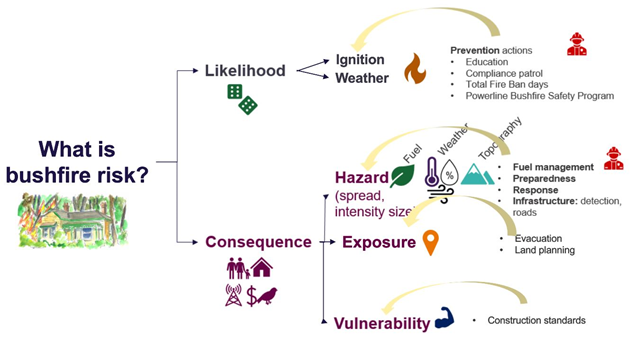Future expansion of Forest Fire Management Victoria’s (FFMVic) fuel management report
Fuel management reporting to stakeholders is essential to ensuring transparent, effective bushfire risk management and delivering better outcomes for all Victorians.
In response to the Victorian Auditor-General’s Office Reducing Bushfire Risk independent assurance report to Parliament, and the Inspector-General for Emergency Management’s Inquiry into the 2019–20 Victorian Fire Season, DELWP committed to expanding both the annual fuel management report and its Monitoring, Evaluation and Reporting Framework for Bushfire Management on Public Land (the Bushfire MER Framework) to incorporate private land, roadsides and public land managed by other agencies. Initially, this expansion will commence by including identified robust and available activity data in the Fuel Management Report 2021–22. It will expand this reporting in subsequent years as DELWP identifies relevant measures and reliable datasets that provide further transparency about activities to reduce bushfire risk and their effectiveness.
This expansion will be based on an independent review of the annual fuel management report and the Bushfire MER Framework, and consultation between DELWP, sector partners, and other land management agencies, that identified possible improvements including how to more fully incorporate fuel management treatments that occur across multiple land tenures.
The review recommended that DELWP:
- adopt a staged, collaborative approach to expanding the fuel management report to all land tenures
- focus on strategic approaches to addressing barriers to reporting about regional performance across all land tenures and fuel managers
- identify the most appropriate additional data to incorporate into the report
- identify data to produce meaningful analysis and reporting.
DELWP will continue to work with sector partners and other land management agencies to respond to the recommendations of the Victorian Auditor-General’s Office and the Inspector-General for Emergency Management. The recommended expansion of the fuel management report will start with the 2021–22 report. The Fuel Management Report 2021-22 will look a little different from previous years, with a number of our metrics and targets currently under review and plans to refresh how we structure and present the report.
There is information about DELWP’s progress implementing the recommendations arising from the Inspector-General for Emergency Management’s inquiry here.
Enhancements to bushfire risk modelling - Risk 2.0
Risk 2.0 is a next-generation, strategic risk modelling project that delivers stronger evidence to support strategic bushfire management decision-making.
Underpinned by DELWP's investment in research, modelling and improvement, Risk 2.0 delivers more accurate bushfire risk assessment using the latest science. It will enable us to better understand and more effectively use prevention, preparedness, readiness, and response strategies to manage bushfire risk.
The figure below illustrates how fire risk analysts and firefighters see and communicate bushfire risk - the likelihood of a fire starting, spreading, and having consequences for the things that are most important to communities, people, property, livelihoods and the environment. To better understand the nature of Victoria's bushfire risk, we analyse different elements of the 'bushfire risk equation', where ‘likelihood’ is the probability that a fire will start and spread, and ‘consequence’ represents the impact if such an event occurs.

Elements of the bushfire risk equation with actions DELWP undertake to minimise impacts
The Risk 2.0 project is already improving how we manage bushfire risk and helping us share improved bushfire risk knowledge with communities - building a more sophisticated understanding of bushfire risk across Victoria.
Risk 2.0 will overcome limitations of the statewide risk modelling approach and the bushfire risk metric, including by:
- updating data layers and models
- increasing spatial resolution
- extending the range of modelled weather scenarios
- introducing ignition and weather likelihood into risk assessments
- extending modelling to consider risks to a greater range of values
- producing communication materials that ensure data and model enhancements are supported by, understood by, and fit for purpose for agencies and communities
- providing the technological framework including web-based data storage and processing to support enhanced bushfire risk modelling
- creating the foundations for future improvement of the risk-based approach, which include:
- assessing cost-effectiveness of fuel management strategies to make informed trade-offs between strategies
- quantifying risk reduction and cost effectiveness of additional management levers
- assessing risk spatially for a range of geographical scales and across multiple temporal scales (strategic, seasonal, preparedness and response).
Establishment of the new Office of Bushfire Risk Management
In response to the Inspector-General for Emergency Management’s Inquiry into the 2019-20 Victorian Fire Season, the Victorian Government committed to establishing an Office of Bushfire Risk Management (OBRM) within the Department of Environment, Land, Water and Planning (DELWP).
The office was established on 01 July 2021 and over the next four years will lead and coordinate the implementation of evidence-based fuel management policy, practice and assurance, and reporting on activities on both public and private land in Victoria.
Critical to establishing this new over-arching framework will be working alongside land management and fire response agencies FFMVic, the Country Fire Authority, Fire Rescue Victoria, Emergency Management Victoria, local government, landholders, road authorities and the community. Together with an independent expert advisory panel, the Office will have a key role in delivering the improvements to land and fire management recommended by the Inspector-General.
The Office will play a critical role in developing the Managing Victoria’s Bushfire Risk: Fuel Management Report 2021-22, incorporating enhancements to bushfire risk modelling, review of risk management targets and a re-fresh of how these performance targets are evaluated and reported.
Page last updated: 23/12/21